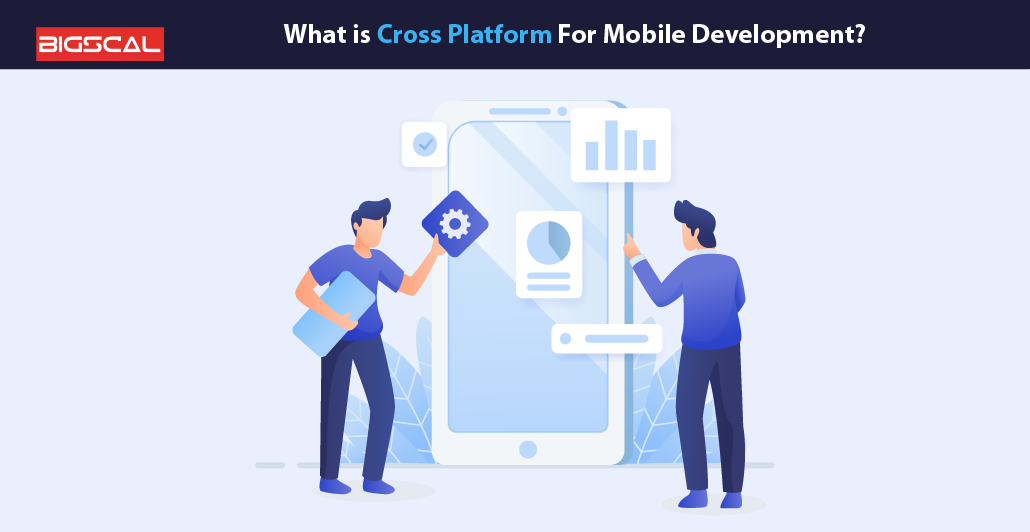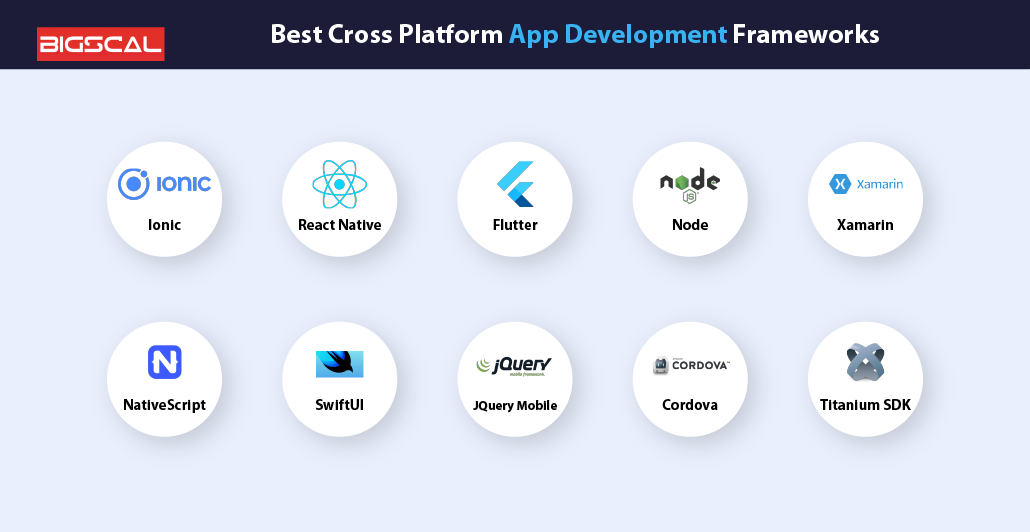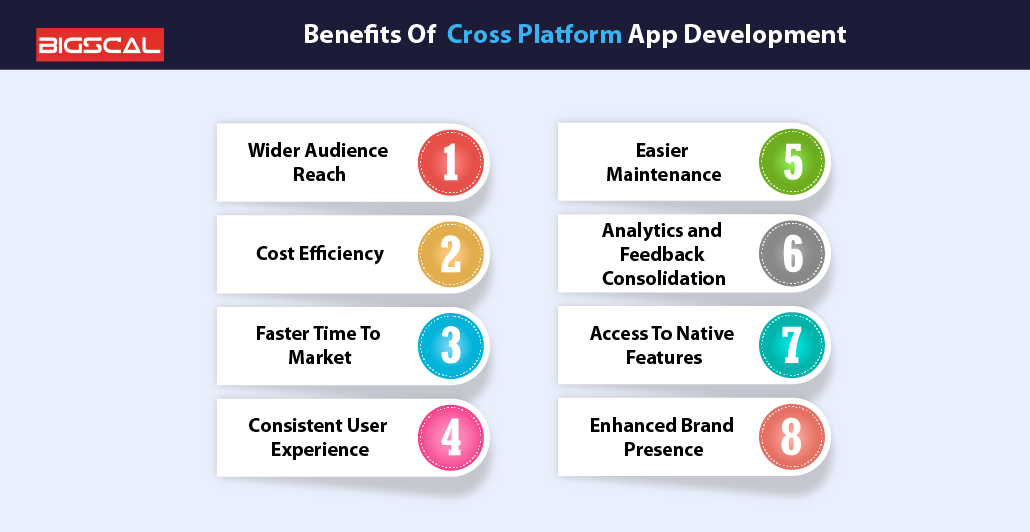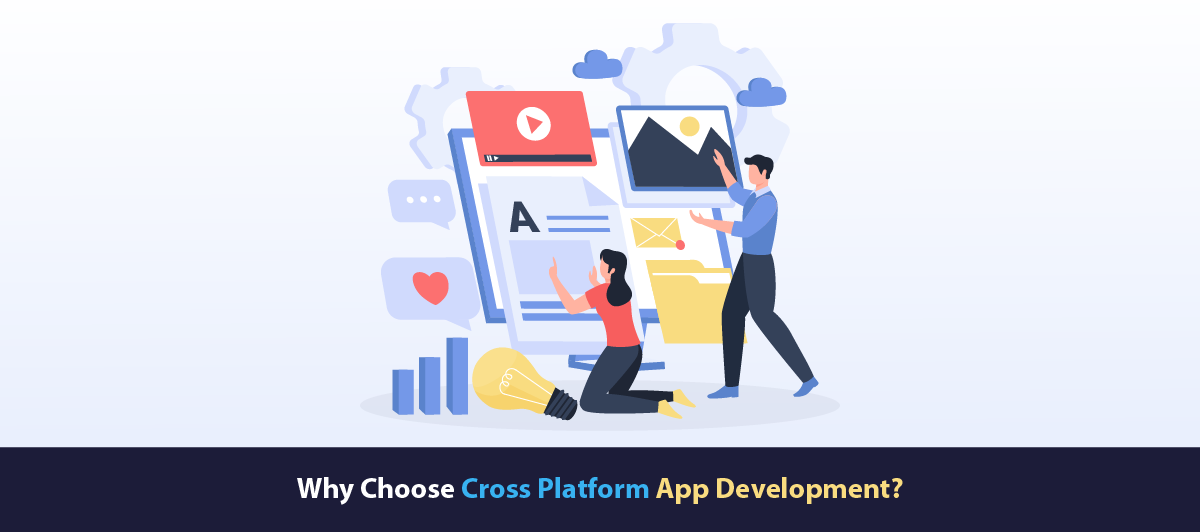How Cross Platform App Development Boosts Your Business Success
Quick Summary: Cross Platform App Development is undoubtedly a preferable choice of developers and software development companies. But why? That’s what we will discuss in this blog. We tell why you should and why almost all developers are approaching cross platform apps development. Read this article!
Introduction
Cross platform app development is an exceptional choice for software development. It allows companies cost-effective and efficient solutions to reach a wider audience. In today’s connected world where users seamlessly switch between different devices and operating systems, businesses can adapt by running compatible applications across multiple platforms.
This approach not only streamlines the development process but also provides a consistent user experience, increases customer satisfaction and loyalty. By using multiple operating systems development frameworks such web technologies such as React Native, Flutter, or Xamarin. Businesses can accelerate time to market of their applications while reducing development costs. If they create cross platform apps development This accessibility for more users, spanning iOS, Android, and even web platforms, revenue generation, and opening up new avenues for market expansion.
Additionally, cross-platform mobile app development services makes it easier to maintain and update, as changes can be applied equally across platforms. This agility allows companies to react quickly to market trends and customer feedback, thus staying ahead of the competition.
In this blog series, we’ll delve into the myriad ways cross-platform app development can drive business success, examining its impact on customer engagement, revenue growth, and overall brand formation easy in today’s dynamic digital ecosystem
What is Cross Platform For Mobile Development?

Cross platform mobile apps development refers to the practice of building mobile applications that can run on different operating systems such as iOS and Android using a single codebase. This approach allows developers to write code once and deploy it to different platforms, time resource compared to different apps developed for each platform and protected.
Various frameworks and tools, such as React Native, Flutter, Xamarin, and Ionic, enable cross-platform development by providing libraries and APIs that pull platform-specific details Developers use these frameworks to create user interfaces, access device features, and other cross platform app framework and logic. You can also use it to control it anonymously.
While Cross Platform software Development offers performance and cost benefits and can sometimes sacrifice performance or gain platform-specific features, it’s a popular option for businesses and developers looking to deliver their mobile applications to a large audience.
Best Cross Platform App Development Frameworks
- Ionic
- React Native
- Flutter
- Node
- Xamarin
- NativeScript
- SwiftUI
- JQuery Mobile
- Cordova
- Titanium SDK
Read more: Top 8 Benefits Of SaaS Application Development For Business
Benefits Of Cross Platform App Development
So, in this section we are going to tell you how cross platform application development helps businesses to boost success effectively. Check it out:

Wider Audience Reach
Cross-platform app development allows developers to create apps that can run on different platforms like iOS, Android, and Windows. This approach greatly expands the potential audience for the app. Instead of targeting users on just one platform, these cross platform app developers can cater to broader demographics and reach users across devices and operating systems.
By creating an app that works seamlessly across platforms, developers can tap into different user bases without having to create separate versions or native apps for each platform This not only saves time and resources but also ensures that no one is left out he or she can use it because of device selection or a control system.
Additionally, reaching more people can lead to more user engagement and ultimately more revenue. With so many users coming to the app from so many different locations, there are many opportunities for spiritual growth through word-of-mouth and social participation. In addition, the audiences provide developers with valuable insights into user preferences and behavior, which can lead to future redesigns and improvements to the app.
Cost Efficiency
Cross-platform app development offers a significant cost advantage compared to developing separate full apps built for each platform. Leveraging frameworks like React Native, Flutter, or Xamarin allow developers to write code once and deploy it across multiple platforms, reducing development time and cost.
By using a single codebase, developers can simplify the development process, eliminating the need to maintain separate codebases and separate native apps for iOS and Android. This not only slows development time but also reduces the resources required for testing, debugging and updating.
Additionally, cross-platform development enables developers to make better use of existing skills and resources. Instead of hiring separate teams for iOS and Android development, companies can invest in a single team that specializes in existing web development skills and in cross-platform technologies, saving on personnel and training costs.
Faster Time To Market
Cross-platform app development speeds up the time to market of your app by allowing developers to write code once and deploy it to multiple platforms simultaneously. As cross-platform development frameworks like React Native, Flutter, or Xamarin allow developers to use one codebase for all their cross platform applications.
This approach significantly reduces development time, as developers can use shared codebases, libraries, and tools across platforms. Additionally, popular cross platform third-platform development frameworks often offer features. These features are hot reloads, enabling developers to see changes made immediately, speeding up the debugging and iteration process.
By streamlining the development process with cross platform frameworks and eliminating the need to write and maintain a separate codebase for each platform. Cross-platform app development enables businesses to launch their apps faster, giving them a competitive edge in the marketplace.
Consistent User Experience
Maintaining a consistent user experience across platforms is critical to building brand loyalty and user satisfaction. Cross-platform app development ensures a consistent user experience across platforms and devices. With a single codebase platform app development framework, developers can maintain consistency in design, features, and functionality across iOS, Android, and other platforms.
These meetings are very important to build brand and user trust. Users expect seamless experiences no matter what device they use, and cross-platform development ensures the same experience no matter if they’re using an iPhone, Android smartphone, or tablet.
In addition, cross-platform development processes often provide responsive design tools and resources that adapt to different screen sizes and resolutions. It ensures that the application design and quality remains consistent and user-friendly in a wide range of devices.
Moreover, by putting consistency at the forefront of the user experience, cross-platform app development helps businesses build stronger relationships with their audiences. It also builds users satisfaction and retention improvement.
Easier Maintenance
Cross-platform app development offers the advantage of ease of maintenance due to its integrated codebase. Instead of maintaining separate codebases for different platforms, developers can maintain a single codebase for all platforms. It significantly reduces performance when updates or fixes are needed. Developers can use it once and deploy it to all platforms at the same time, which makes it stronger and more efficient.
In addition, with cross-platform development frameworks like React Native or Flutter, developers can use hot reload features. Which allow real-time visibility of changes during the development process. This not only speeds up the development cycle not only facilitates debugging and rapid development.
Additionally, because the codebase is shared, any improvements or enhancements to the code will support all platforms simultaneously. It ensures consistency of functionality and user experience across devices and operating systems. Moreover, the flexible maintenance process for cross-platform development helps developers app. It allows you to focus more on improving functionality and user experience. Rather than dealing with the challenges of maintaining multiple code bases.
Analytics and Feedback Consolidation
Cross-platform app development allows developers to integrate analytics and feedback from different platforms into a single dashboard or an operating system itself. This simplifies the process of monitoring user behavior, monitoring app performance, and collecting data across devices and operating systems. By focusing on analytics and feedback, developers gain a thorough understanding of their application’s performance and user engagement metrics.
Having access to integrated analytics allows developers to make data-driven decisions on application improvements, feature improvements, and bug fixes. Trends, patterns, and user preferences can be identified across platforms. It helps to prioritize development efforts and optimizing the user experience.
Additionally, the placement of feedback from multiple sources ubiquitous enables developers to respond to user concerns faster. They can also manage issues more efficiently, and implement requested features or enhancements.
Access To Native Features
Cross-platform app development frameworks like Xamarin, React Native, and Flutter provide access to native features of different platforms. Through plugins, APIs, or platform-specific modules. Thus, it enables developers to leverage the full capabilities of each platform when they are writing native code either in the same language or using an integrated codebase.
By moving to native features, developers can create high-performing, feature-rich mobile apps, that deliver seamless user experiences across platforms. Device specific functions such as camera, GPS, accelerometer and push notifications can be used. And with that they do not need to compromise functionality or user interface stability
Additionally, having native features enables developers to stay top of the latest mobile platform and developments. They can quickly add new functionality to their apps. This ensures that the app remains competitive in the market and offers new features and experiences to its users.
Enhanced Brand Presence
Cross-platform app development enables businesses to reach a wider audience across devices and platforms, thus increasing their brand presence. By using cross platform framework companies can ensure that their brand is accessible to users regardless of platform preference. This increased access not only expands their potential user base but reinforces the brand’s image as forward-thinking and customer-focused.
Additionally, consistent brand presence across platforms helps establish brand recognition and trust among users. When users have access to brand apps on multiple platforms, they are more likely to perceive the brand as trustworthy and professional. This can increase customer loyalty and recommendations, as users feel more connected to the brand across different touch points.
In addition, cross-platform development enables businesses to maintain brand identity. As it ensure consistent design elements, features and messaging across all versions of the application. This consistency strengthens brand identity and values, respectively the users with the brand.
Adaptable of Market Trends
Cross-platform application development enables companies to quickly adapt to market trends and customer preferences. Unlike native app development, which often requires separate development efforts for each platform. Cross-platform frameworks allow for rapid iteration and implementation of updates.
This flexibility is especially useful in fast-moving industries where market trends can change rapidly. With cross-platform development tools, businesses can quickly implement changes and introduce new features to stay ahead of the competition. Additionally, the ability to deploy updates simultaneously across multiple platforms. It ensures a consistent user experience and reduces the risk of fragmentation.
In addition, cross-platform development systems often come with built-in features for analytics and performance management. These systems enables businesses to gather valuable insights into user behavior, market trends. With leveraging this data and optimizing companies for future updates. It helps to be able to make informed decisions on the topic. It assure their app is still relevant and competitive in the marketplace.
Elevate cross platform mobile development With Bigscal Technologies
Are you searching for a company who can provide you mobile app development services and build a cross platform app? Then Bigscal is the stop for you.
We excel at elevating cross-platform mobile development to new heights. Leveraging cutting-edge technology and industry best practices, we empower businesses to reach their audiences across channels with ease. Our expertise lies in building robust and scalable mobile applications using frameworks such as React Native, Flutter, and Xamarin etc.
By focusing on efficiency and cost effectiveness, we streamline the development process without compromising quality. By leveraging the power of cross-platform development, we ensure consistent user experience while optimizing development time and content. Our experienced team of manufacturers works one-on-one with clients to understand their specific needs. Therefore, we deliver bespoke solutions that exceed expectations.
Conclusion
Adopting cross-platform application development can dramatically increase business success in various ways. As you have read the benefits, It expands market reach, reduces development costs and streamlining maintenance efforts, and more. With the use of frameworks like React Native or Flutter, businesses will be able to create high-quality apps. These apps can work seamlessly across multiple platforms, cater to a broad range of audiences. Embracing advancements cross platforms enables businesses to remain agile, competitive, and responsive to evolving customer needs.
FAQ
What is cross-platform in mobile development?
Cross-platform in mobile development refers to the ability of a single codebase to run on multiple operating systems. Such as iOS and Android, allowing developers to write once and deploy everywhere.
What is the best cross-platform mobile development language?
There isn’t a definitive “best” language for cross-platform mobile development. It depends on factors like project requirements and developer preferences. However, popular options include Flutter (Dart), React Native (JavaScript), and Xamarin (C#).
Is cross-platform mobile development worth it?
Yes, cross-platform mobile development can be worth it for many projects. It can save time and resources by allowing developers to write code once and deploy it on multiple platforms. It also helps to reach a larger audience efficiently. However, it’s essential to consider factors such as performance, user experience, and project requirements before deciding on a development approach.
What is the most used cross-platform mobile development?
As of my last update, React Native is one of the most used cross-platform mobile development frameworks. It’s popular among developers for its ease of use, performance, and large community support.
Name some cross-platform mobile apps?
Some popular cross-platform mobile apps include:
- Skype
- Airbnb
- Discord
- Uber
- Walmart
- Flipkart





